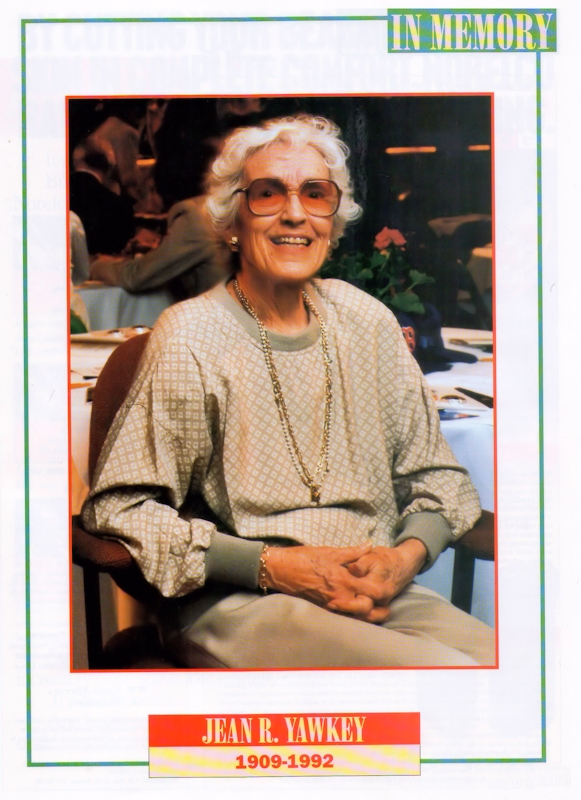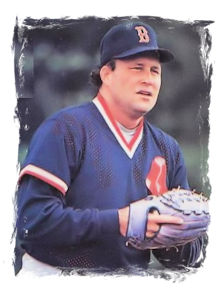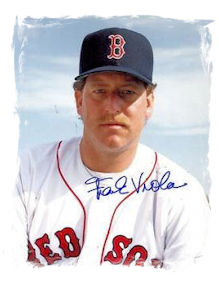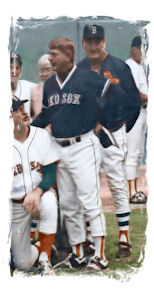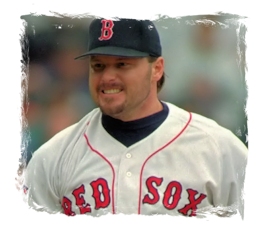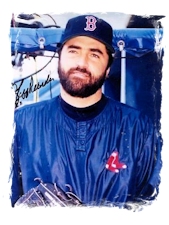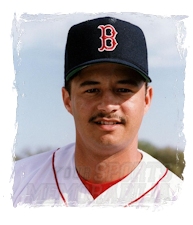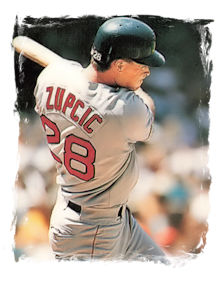|
1992 BOSTON RED SOX ...
After the failure of the 1991 season, the Red Sox let manager Joe Morgan go. He was replaced by Pawtucket manager and former player Butch Hobson. The front office liked Hobson's perceived toughness. He had been a hard-nosed player and had played football at the University of Alabama for the legendary coach Bear Bryant. He talked like a football coach but in five seasons as a minor-league manager, he finished over .500 only twice. The Red Sox hoped he would be the new Dick Williams. But Hobson looked scared and awkward from day one. He proved he wasn't prepared for the scrutiny of the job on the first day by admitting he had had no other offers from other teams.
On January 2nd, the Red Sox signed Minnesota Twins left-handed pitcher Frank Viola to a three-year contract for $13.9 million and, free Agent outfielder, Herm Winningham was signed on January 29th, for what became his final year in the big leagues. But Lou Gorman did very little else in the way of moves. Jody Reed headed toward the season with an unresolved contract. An arbitration hearing was held in February and although healthy offers had been exchanged and the two sides were just $350,000 apart ($1.9 million vs. $2.25 million), Reed stuck with his $2.25 million number as a matter of principle and consistency. He felt the team had kept him in a submissive position for four years. The Red Sox won the arbitration, but Reed�s salary nearly doubled. Carlos Quintana was injured in a car accident in Venezuela, breaking his arm and foot in February. According to reports, his brothers Roberto and Eddie had been shot as they were traveling to an event when another vehicle hit theirs. The other driver, in the heat of the argument, shot one of the brothers and fled the scene. Quintana quickly transferred his brothers into his car to seek medical assistance. En route, his car in turn was hit by another vehicle, crashing into a bridge. He broke his left arm and his right big toe. While the five-hour surgery was successful, an infection in his pelvis caused additional operations a month later. The accident altered the Red Sox plans at first base.
On February 20th, Jean Yawkey suffered a stroke and died six days later. Apart from the two-thirds interest in the Red Sox, she left the bulk of the remaining Yawkey fortune to charity. Her two-thirds ownership of the team was left under the control of the "Jean Yawkey Trust" managed by John Harrington. The other third of the team was controlled by Haywood Sullivan. The Red Sox still trained in Winter Haven, but this would be their last year there. Roger Clemens showed up a week late for camp, instead training at his home in Houston. Many of the players perceived it as a slap to the face of Butch Hobson. The Red Sox were rather awful in the spring and Hobson seemed tighter and more ill at ease every day. Former manager, Don Zimmer was then brought back and hired to become the third-base coach.
On Opening Day, homers, by Phil Plantier and Mo Vaughn, were solos. Sox hitters could muster only two other hits against Yankee starter/Red Sox stuffer Scott Sanderson (now 6-1 lifetime against them) as Butch Hobson lost to Buck Showalter in their respective managing debuts, 4-3, at Yankee Stadium on April 7th. After losing the first two in New York, the Red Sox and Indians played 19 innings in Cleveland on April 11th. The Sox ended the long journey with a 7-5 win over the Indians on Opening Day for the Indians. Shortstop Tim Naehring, a native of Ohio who entered the game in the ninth inning, delivered a two-run homer off Eric Bell just over the left-field fence in the top of the 19th with Mo Vaughn on second, to end the longest game by time (6 hours 30 minutes) in Indians history.
On April 12th, the 33-year-old left-hander, Matt Young, became only the third pitcher to throw a complete-game no-hitter and lose the game. Pitching in the first game of a doubleheader against the Indians in Cleveland, Young lost 2-1. Since his complete game was only eight innings long, Young�s gem is not recognized as an official no-hitter. He lost his no-hitter because of a ruling made by commissioner Fay Vincent following the 1991 season when he decided that no-hitters were not official if a pitcher throws only eight innings in a complete-game loss on the road. Young, who threw 120 pitches (63 strikes and 57 balls), had three 1-2-3 innings, and a lot of chaos in between. Kenny Lofton, whom Young put on three times with walks, and cored in the first when, with one out, Luis Rivera made a throwing error on a routine grounder. In the third, Young walked two batters. A couple of fielder's choices and a steal by Glenallen Hill produced the second Indians run. The Red Sox however, came back to win the nightcap, 3-0, behind the two-hit pitching of Roger Clemens, capping off an improbable start to the season. Jody Reed's bases-loaded, two-run bloop single in the eighth won the game on April 15th back in Boston. Tim Naehring's sacrifice bunt in the eighth pushed runners to second and third before Reed's hit off the Orioles' Mark Williamson won the game, 6 to 5. On April 17th, Roger Clemens endured a 2-hour 22-minute rain delay at the start of the Red Sox-Blue Jays clash at Fenway Park. He came back from a 58-minute rain delay after working four innings and throwing 71 pitches, winning, 1-0, striking out 11 in seven innings as four Sox pitchers combined on a three-hitter. He extended his scoreless string to 18 innings and had struck out 23 batters in his first two games. Scott Cooper came in to pinch-hit, driving in the final run of a bottom-of-the ninth, four-run rally to beat the Blue Jays, 5-4, on April 19th. The Sox concluded their first homestand, winning three and losing three, and headed to Milwaukee. The key to the April 21st first game of the series, a 3-1 victory over the Brewers, was a gamble by the Red Sox in the eighth inning. Tony Pena took off from second on a 3-2 pitch and scored on a base hit by Jody Reed, breaking a 1-1 tie and bringing Boston one of its more improbable victories in years. Frank Viola picked up his first Red Sox win on April 24th, beating the Rangers back at Fenway, 3 to 1. The Red Sox, for a change, featured their offense in a 6-3 victory over the White Sox, on April 28th, behind a seven-inning, nine-strikeout performance by Roger Clemens. Roger improved 3-2 while dropping his ERA to a minuscule 1.38. Crash, bam, boom! It was a sweet sound as Boston rolled to a 6-1 victory the next night, April 29th, over the White Sox. Crash was Jody Reed, who got on base three times via singles and scored twice. Bam-Bam was what a pair of doubles by Phil Plantier sounded like. He drove in three runs. The boom was lowered by lefty Frank Viola, who would have had his third complete game had not manager Butch Hobson gotten a queasy stomach. The bases were loaded in the bottom of the ninth inning, and the tying run was in the on-deck circle. Jeff Reardon came in and promptly retired Matt Merullo on a foul pop, earning his fourth save. The Red Sox were only 9-9 for the month of April and were in 4th place, five games behind. They batted just .232 with six home runs, its lowest totals in both categories since 1972. But they won the finale in style, sweeping a two-game series from the White Sox.
The Red Sox overcame 4-0 and 5-4 deficits and overhauled the Kansas City Royals, 6-5 on May 1st. They chipped away and tied the game at 4-4, fell behind in the top of the ninth, then won it against Jeff Montgomery, one of the American League's best closers. Montgomery walked a batter and gave up a hit. Mo Vaughn delivered with a base hit for the walk-off game-winner. Jack Clark cranked out three hits and three RBIs in leading the Sox to a come-from-behind 7-6 win over the Royals the next day on May 2nd.
Frank Viola led the Sox to a 4-1 victory over his former team, the Minnesota Twins on on May 5th. He went 7 2/3 innings, leaving after Kirby Puckett singled to right to knock in the Twins' only run. The lefthander allowed nine hits while improving his record to 3-2 and lowering his ERA to 2.70. Viola, who threw 118 pitches, had won his last three starts, and in his last 22 1/3 innings had allowed only two earned runs. But the Sox were not putting runs on the scoreboard. Hobson shuffled his lineup trying to come up with a winning combination. Benching Jack Clark and Mo Vaughn were all well and good, but it is mere tinkering. A lineup with Scott Cooper, Tim Naehring and Tom Brunansky in the power positions was faced with the same plodding reality, and reality was something Hobson had to deal with. Vaughn (.194 BA) was sent back to Pawtucket on May 8th. The Red Sox were not a team of stars that suddenly was going to crunch home runs. They hadn't been a home run-hitting team since 1986. The combination of a lack of power, a lack of speed, and a decline in the high on-base/low strikeout offensive makeup they had, when Walter Hriniak was here, was dangerous only when the wind was blowing out in Fenway. The Sox had lost 7 of 8 before Roger Clemens shut out the Royals in KC on May 9th, 5-0. On May 10th, Jack Clark showed what he was capable of. He carried the Red Sox to a 10-6 victory over Kansas City that wasn't nearly as close as it sounded. At long last, his teammates saw a Jack Clark-athon. Six runs batted in on two mammoth homers and a run-scoring single. Batting from the cleanup spot and playing first base for the first time since 1990, when he was with San Diego, Clark did it all, which won the deciding game of a three-game series. His third-inning home run, his first of the day, a three-run shot off lefthander Mike Magnante, was a tape-measure job.
The Sox came home 7 1/2 games out of first place. Clemens was the Red Sox's insurance against long-term disaster. When he pitched, they had a chance. On May 15th at Fenway Park, he snapped the losing streak with a 3-0 win over the Angels, throwing a four-hitter for his third shutout and sixth complete game of the year. He ran his record to 5-3, lowered his ERA to 1.64, extended his scoreless streak to 18 innings, and provided the major entertainment for a packed house. Frank Viola (5-2, 2.60 ERA) won his fifth straight when he shut out the Angels, 3-0 the next night, May 16th. Herm Winningham knocked out two hits and scored two of the Sox runs. Before the game, the 1967 Red Sox were saluted on this, their 25th anniversary. The '67 Sox beat the '67 Heroes team, 3-0, in an exhibition game. Mike Gardiner, 3-1, dropped his ERA to 3.26 with seven shutout innings in which he allowed only two of the Seattle Mariners' seven hits on May 18th. Tony Fossas, Greg Harris and Jeff Reardon protected the lead as the Sox inched their way back to .500 (17-17) after 34 games. In the next game, on May 19th, the Sox beat the Mariners, 7 to 5. It took two wild pitches by Seattle pitcher to seal their fate. One allowed the Sox to tie the game and the next allowed the winning run to score. Timely hitting and spectacular fielding plays made the Red Sox warm, if not hot. They chugged past the Seattle Mariners for the third straight time on May 20th with a 6-4 comeback. Clemens won his third straight game. There was also a big bang from the offense that always seemed to sleep. Ellis Burks provided it with a grand slam in the bottom of the eighth, breaking a 2-2 tie. And Bob Zupcic made a diving, sliding catch of a Pete O'Brien line drive in the seventh that could have helped the Mariners break open a splendid pitching duel between Clemens and rookie lefthander Dave Fleming. For six innings, Clemens looked almost like Clemens, not overpowering but still in control. No shutout. No complete game. A struggle. He went eight innings before giving way to Tony Fossas and Jeff Reardon, who recorded his 10th save and preserved "Rocket's sixth victory.
The bats came alive for the Red Sox on May 23rd. they scored five runs on 12 hits for a 5-1 victory over Oakland. Jody Reed went 3-for-4 and Wade Boggs had two hits, including a home run. John Dopson won his first game in two years. The Sox (20-19) concluded their 6-3 homestand and headed out to the West Coast, in 4th place, 4 1/2 games behind. The Red Sox' 4-1 victory over the Angels in Anaheim, on May 26th was highlighted by Roger Clemens' two-hit effort over eight innings, a typically unhittable performance in which he surrendered California's only run in the fourth. He struck out eight and lowered his ERA to 1.65. Jeff Reardon came on to retire the Angels in the ninth (one hit), his 11th save in 11 opportunities. Mike Greenwell slammed an extra-base hit, his first this year, and also had another hit to pace Boston's nine-hit attack along with Ellis Burks, who also had two hits. The next night, Jack Clark (.196 BA) was walked with the bases loaded in the 10th inning, to push the Sox ahead 4 to 3 over the Angels. Finally, Joe Hesketh pitched seven strong innings as the Sox swept the Angels, 2 to 1, and moved to within 2 1/2 games of first place on May 28th. Mike Greenwell's fifth inning RBI single gave the Sox the winning run. 1986 was the last time the Red Sox swept a three-game series at the Big "A". After sweeping the Angels, the Sox moved on to Seattle and lost two straight games. The Red Sox needed a victory. They needed Roger Clemens to stop a southbound slide. He did. The Sox struggled to score for six innings, but he smothered the Mariners on May 31st. Clemens was clinging to a 2-1 lead when the Sox batters finally blew it open with three in the seventh and two more in the eighth. The Rocket's reputation says he almost always will deliver after the Sox lose. Lifetime, he was 83-27 after a defeat. This year he was 6-1 after a loss.
In Oakland, the Sox got a near win on June 3rd, as they rallied from a couple of deficits before and after a brawl. But those surges proved as fleeting as the hostilities. The Sox came limping home on the heels of a 7-6 loss, their third in a row here and fifth in six games, wrapping up a 4-5 trip on which they lost ground in the American League East. On June 6th, Roger Clemens became the major leagues' first nine-game winner with a 5-1 victory over the Indians in the first game of a doubleheader, and it had stopped another losing streak. But it would take more than his efforts to get the Sox above .500. For reasons too difficult to pinpoint, the Red Sox were unable to escape their early season funk. The Sox shut out the Indians, 4-0 on June 7th. First and foremost, there was the stalwart pitching of starter Joe Hesketh (2-3, 3.05 ERA), who threw 6 1/3 innings of four-hit, shutout ball before a blister forced his exit. Next was the solid relief from Danny Darwin, who gave up three hits and struck out three in his 2 2/3 innings, to earn his third save. Although it denied Jeff Reardon the opportunity to pull within one game of the career save record, it seemed to come as retribution for the four wins the bullpen had blown for Hesketh. Butch Hobson was mad and finally exploded following the next night's 5-2 loss to the Orioles on June 8th. Camden Yards was no different from Comiskey Park, the Coliseum in Oakland, the Metrodome, and the Kingdome. The Red Sox found a new place to lose. All the wonderful little things the Red Sox did one day were afterthoughts the next. Wade Boggs, who homered and doubled wouldn�t comment. Mike Greenwell just walked away. The next night, June 9th, the Sox showed the kind of heart and emotion Hobson had been trying to instill the past couple of days. Hobson wanted the point to be clear, especially in this most crucial week for the Sox. This was hardly easy. The score was 0-0 until the eighth, when Tom Brunansky, playing in place of Phil Plantier, twice failed to lay down a sacrifice bunt, then doubled on a 0-2 pitch to left-center. That scored the first run and ignited a four-run rally that Jeff Reardon made stand up. Working a busy ninth inning, Reardon recorded his 13th save of the season and was now one shy of tying Rollie Fingers' career record.
The bottom line was that the Red Sox could pitch, and could not hit. The latest demonstrations of those twin realities came during the last game of the series, where the Orioles took the deciding game of this three-game series with a 3-1 victory on June 10th, which looked distressingly like many another Red Sox games in this win-one, lose-one season. The pitching was good enough to win a lot of games, but the offense wasn�t there. After getting shut out, 4 to 0 the next night in Toronto, the Sox fell 8 1/2 games out of first place. On June 12th, Wade Boggs won the game in Toronto with a grand slam homer. Just when all hope seemed lost, Boggs and Frank Viola (6-4) came to the emotional rescue of Red Sox Nation. The Sox won 5-0. Viola hurled 7 1/3 innings, winning for the first time in four weeks, and Boggs provided the punch with an all-too-rare, game-breaking homer. The blast wasn't a two-out, bottom-of-the-ninth buzzer-beater, but it won the game and brought the Sox back to sea level (28-28). The Sox led, 1-0, and Viola was looking a little shaky when Boggs came to the plate with the bases loaded and two outs in the fifth. Boggs took the first offering for a ball, then went for a pitch at his knees and launched a dome run over the fence in right. It was his fifth homer of the season, the third grand slam of his career, and a gold rush of offense for the much-ridiculed Sox batters. The next day on June 13th, a 5-3 win over the Blue Jays was the Sox' second in as many days. The Sox slammed 10 hits, including three homers by Ellis Burks, Mike Greenwell and Phil Plantier. The win, which brought the Sox back above .500, was just as much about their slugging prowess, as the pitching, which produced four homers good for eight runs in two games. The Red Sox finished the relatively important four-game series against the Blue Jays with a split, and they ended a seven-game trip, with three wins in seven games. Back at Fenway on June 15th, John Dopson was on his way to a complete-game shutout. Despite a brilliant eight innings, in which he threw only 95 pitches and had the Yankees pounding the ball into the ground, Butch Hobson brought in Jeff Reardon to close it out. So Reardon came into a tight spot and chalked up his 342nd save in the 1-0 win. In the process, he surpassed Rollie Fingers as the career saves leader After the game, Clemens, Viola and Brunansky carried Reardon off the field on their shoulders. But if not for Phil Plantier's fifth-inning homer, it might never have happened as the Sox' weak offense produced only three hits in support of Dopson, who improved to 3-2. On June 16th, the bases were loaded and all Ellis Burks wanted to do with two outs in the bottom of the 10th inning was hit something that would grab some Fenway sod. On a 2-and-2 offering, Burks poked a single into right field, scoring Jody Reed for a 4-3 victory. The hit culminated a long evening of baseball, but one that saw the Sox go two games over .500 and gain ground on Baltimore and Toronto, both of whom lost. Tom Brunansky led a Red Sox revival with a 4-for-4 effort which accounted for half of the Sox hits in another 4-3 decision the next night. The Sox took 3 of the 4 games they played with the Yankees. In Texas, the Sox lost three straight even Roger Clemens couldn't bail out the Sox on June 21st. He had a 2-0 lead after five innings, but the Rangers scored three times in the sixth and held on to win, 3-2. Swept by the Rangers, the loss dropped the Sox to 32-33. They fell below .500 for the first time since the middle of June. The three straight losses in Texas were followed by three straight in Tigertown. Along the way in this tour de terrible, Boston's entire starting outfield went down. The Red Sox had lost seven straight and on June 24th were in fifth place, a season-high 9 1/2 games out of first. They were a mess. After being sent down to Pawtucket, Mo Vaughn had blasted manager Butch Hobson and said there was a double standard. He implied he was sent down for reasons other than baseball. The Sox recalled Vaughn even though he was hitting .185 with two homers and 11 RBIs in 23 games. Battered, bruised, and virtually buried following an 0-6 trip to Detroit and Texas, the Red Sox produced a relentless assault of singles and doubles (13 hits worth) to defeat the Milwaukee Brewers, 8-4, on June 26th at Fenway, ending a seven-game losing streak. There was subplot upon subplot in a melodrama at Fenway Park on June 27th. Everything from the Red Sox coughing up a 7-0 lead, to Roger Clemens failing to win his 10th game for the fourth time, to Jeff Reardon's horrible performance, to Herm Winningham's game-winning hit. It all came in an 8-7 win over the Milwaukee Brewers in 13 innings. The Red Sox did appear to be making an offensive comeback, however. They had scored 24 runs in their last four games. On June 29th, Steve Lyons became the first player the Red Sox have ever hired three times, as he was purchased from the Montreal Expos to replace Ellis Burks, who had gone on the disabled list. And on one night, June 30th, amid all the garbage that Hobson had to muddle through this season, all of his boys of summer were the heroes in an 8-5 comeback victory over the Tigers. Bob Zupcic hit a ninth-inning grand slam to complete a night that, before the fireworks, was not typical of Red Sox games this year. The Red Sox, 11-17 for the month, were in fifth place, 8 1/2 games out of first.
The next night on July 1st, a five-run seventh inning, spearheaded by Tom Brunansky's three-run double, sparked a 6-4 win over the Tigers. Scott Cooper, hitting .324 with runners in scoring position, drove in both Red Sox runs on July 4th, leading the Red Sox to a 2-1 win over the White Sox at Comiskey Park. The Sox ended their nine-game losing streak on the road with a modest eight-hit attack against 11-game winner Jack McDowell. They won behind the splendid offerings of their lefthander, Joe Hesketh. 42 times in 78 games the Red Sox scored three runs or fewer, and as Jody Reed kept his bat on his shoulder, watching a 3-2 pitch from Greg Hibbard with the bases loaded in the second, he looked bad, as the Sox quietly lost 3 of 4 at Comiskey Park. After watching closer Jeff Reardon give up a one-out homer in the ninth inning to George Brett, wiping out their 2-1 lead, and after surviving a scary top of the 11th on July 7th at Fenway Park, the Red Sox ended their two-game losing streak dramatically with a 3-2 win. Tom Brunansky's liner over Kansas City right fielder Jim Eisenreich's head with the bases loaded and two outs in the bottom of the 11th, ended a 3 hour and 52 minute marathon, in which the Red Sox left 14 men on base, but got clutch pitching most of the night. A Kansas City blunder followed by Phil Plantier's single to center, broke a 4-4 tie on July 8th. The result was a 5-4 win over the Royals. On July 9th, the Sox traded Tom Bolton to the Cincinnati Reds for Billy Hatcher. Even in the tough times in Boston, there was still great entertainment value at Fenway Park. On July 10th, in a 6-5 Red Sox thriller over the White Sox, Bob Zupcic's second dramatic grand slam in two weeks, in the bottom of the eighth inning, transformed a 2-1 deficit into a 5-2 Red Sox lead. And Mo Vaughn's big two-out triple in the bottom of the ninth, set the stage for Billy Hatcher's game-winning hit off the wall. Hatcher pounced on the first pitch, sending a shot over the head of left fielder Craig Grebeck, scoring the walk-off game-winner. The next night, on July 11th, Tom Brunansky's grand slam homer lifted the Sox to an 11-2 win over Chicago. Going into the All-Star break, the Red Sox (42-43) were winning. After their third consecutive victory, 3-0 on July 12th, over the White Sox, and fifth in their last six, they were 10 games behind Toronto in the AL East. Their master plan to build a team of veterans such as Jack Clark, the man who would tear down the wall, Matt Young, the hard-throwing lefty who would magically transform from loser to winner, and Danny Darwin, the grizzled veteran who would move in as a No. 2 starter, did not pan out. And the Red Sox were left with a master plan, but no masterpiece. What did go well this winter was the free agent signing of Frank Viola, who had won eight and probably should have had 11 victories. But all Sox pitchers had been paralyzed, in effect, by the team's hitting, which had been last, or next to last, all season. The .246 batting average at the break was threatening to be the worst team average since the 1968 Red Sox hit .236. Roger Clemens pitched one scoreless inning in The All-Star Game, at San Diego, where the American League beat the National League, while Wade Boggs went 1 for 3, scoring the first run. Making his second appearance since suffering inflammation in his right foot, Clemens allowed two hits but got out of a two-on, nobody-out jam to continue a four-pitcher shutout at the time. On July 18th, Clemens outdueled Scott Erickson and beat the Twins in Minnesota, 1-0 on a two-hit shutout. The Sox had taken just four of the seventeen one-run games this season and improved their road record to 14-29, the worst in the majors. Rookie right-hander Paul Quantrill made his major league debut for the Sox on July 20th in a 5-3 Red Sox win over the Royals and got the victory, pitching 2 2/3 shutout innings in relief of Danny Darwin. Greg Harris, Tony Fossas and Jeff Reardon (19th save) finished up to preserve Quantrill's win. He entered the game in the sixth inning in a 3-3 tie and did not relinquish the ship. The Red Sox had trailed, 3-0, but got big offensive efforts from Tom Brunansky and Mo Vaughn, who drove in all five runs between them. The Sox next lost 5 of 7 after the All-Star Break and fell 12 games behind. People were no longer coming out to see the Sox. There were 102,127 on hand for the four-game series against the Twins, and after the July 26th, 8-2 loss to Minnesota, the Red Sox' spot in sixth place was reinforced in the American League East. There were times when one wondered about lefthander Frank Viola. In his "Cy Young" days, he was nearly invincible. With the Red Sox, he was often unpredictable. Viola, with relief help from Greg Harris and Jeff Reardon, got his ninth victory of the season in the kind of game the Fenway Faithful had been looking for all weekend on July 27th, a 7-5 win over the Rangers. Tom Brunansky hit his second grandslam homer of the month in this game. Roger Clemens ran his record to 11-7 to pace the Sox to a 6-5 victory over the Texas Rangers at Fenway Park on July 29th. Jeff Reardon mowed the Rangers down in the ninth to record his 21st save. The Sox and Orioles split a doubleheader on July 31st. After winning the first game 7-4, Matt Young served up three homers and lost the second game, 4 to 3. The Red Sox (48-53) finished the month winning 13 of their 29 games and were in fourth place, 12 1/2 games behind.
On August 3rd, Newcomer Billy Hatcher, immediately made his presence felt when he stole home, becoming the first Red Sox to steal home at Fenway since 1968. The steal electrified the Fenway faithful, and Hatcher received both a standing ovation and a curtain call. Roger Clemens easily won his 12th game (his eighth complete game), allowed six hits and four walks, as the Red Sox beat the Blue Jays, 7-1. The Sox rallied again the next night on August 4th when Wade Boggs belted a three-run homer and was joined by homers off the bats of Mo Vaughn and Tom Brunansky, to down the Blue Jays 9 to 4. On August 6th, Frank Viola beat the Yankees at the Stadium, 3-1, improving his record to 10-7 while lowering his ERA to 3.16 with 8 2/3 well-crafted innings, a four-hitter that was in perfect synch with catcher John Marzano, the offensive star of the game. The Yankees could muster only an eighth-inning run, the product of his only bout with wildness with consecutive walks sandwiched around a wild pitch and a sacrifice fly. Viola got two batters in the ninth before Jeff Reardon, who had saved five of his 10 wins this season, came in for two pitches against Roberto Kelly, who grounded to shortstop, giving Reardon his 23d save. Roger Clemens improved to 13-7 while his ERA continued to evaporate (2.20) on August 8th. Jack Clark let the abuse of Yankee fans, who were waving dollar bills at him, roll off his back and pounded an 0-2 homer in the ninth inning to give Boston a small cushion. Phil Plantier had to be thankful New York manager Buck Showalter elected to intentionally walk him to load the bases with two outs in the eighth. It brought Bob Zupcic up to face Scott Kamieniecki, and Zupcic flared a two-run, go-ahead single to right-center field. The Sox never looked back. But the Sox next lost for straight before Roger Clemens saved the Red Sox from last place on August 13th, after beating the Cleveland Indians, 4-2. He improved to 14-7 while his ERA remained at 2.20. He went eight innings and allowed eight hits and two runs. He struck out nine and walked only one, giving up a solo homer to Glenallen Hill in the eighth to make it 4-2. He threw 121 pitches and definitely appeared tired in the eighth. In the 1986 World Series, Jesse Orosco ate up lefthanded hitters, even Wade Boggs. But on August 15th, Boggs patiently watched the ball come out of Orosco's funky motion and softly lined an 0-1 pitch to left-center. His two-run single in the ninth inning propelled the Red Sox and Danny Darwin to a 3-1 victory over the Milwaukee Brewers. Darwin threw a four-hitter in his first complete game of the year. The Sox had lost 3 of 4 in Cleveland and then 3 of 4 at County Stadium, by the Brewers. They were 15 games out of first place. Clemens took the mound at Fenway Park against California on August 18th and allowed just four hits, took over the AL strikeout lead, (164), and notched a complete-game 8-0 victory. Of his 142 pitches, 92 were for strikes. On August 21st, Randy Johnson struck out rookie Eric Wedge in his first two at-bats. In the ninth inning, Wedge lashed a pitch into the left-field stands for his first career home run, driving in Tony Pena. Those were the Sox�s only runs in a 5-2 loss to the Mariners at Fenway. There were few nice stories this season, but on August 22nd the Red Sox not only came back from a 7-3 deficit, they pounded 14 hits in a 10-8 win over the Mariners. Rookie John Valentin's sixth-inning grand slam, his first major league homer, brought them back, and Tom Brunansky's two-run homer in the eighth, broke an 8-8 deadlock. Greg Harris and Tony Fossas each pitched an effective third of an inning, and Jeff Reardon got his 26th save, retiring two in the ninth. The Sox came back to beat Dennis Eckersley and the Oakland A�s, 5-4, at Fenway on August 25th. The Sox scored two eighth-inning runs against the best reliever in baseball, and Jeff Reardon needed only two pitches to retire Sox killer Terry Steinbach with the bases loaded to end the game. The next night, August 26th, Tom Brunansky hit a fourth-inning homer to tie the score, 1-1, and then delivered a two-out, bases-loaded single off reliever Kevin Campbell in the bottom of the 10th inning, for a 2-1 victory, as the Red Sox concluded their homestand going 4-5. Brunansky's heroics saved the day for Frank Viola, who in hot and steamy conditions threw 151 pitches as he improved to 11-10. He posted Boston's second dramatic one-run victory over the A's in less than 24 hours as the American League East cellar dwellers took two of three from the West leaders. On August 28th, Roger Clemens breezed to a 7-1 win at Anaheim Stadium in the opener of the Red Sox's 12-game road trip. It was their third straight win, the longest streak since a three-game stretch leading into the All-Star Break. For the Red Sox, the game had no significance other than as a step up in the American League East basement -- the Sox were tied with Cleveland. Clemens, who improved his record to 16-8 and regained the league strikeout lead with 178 solidified his credentials for his fourth "Cy Young" Award. Having allowed eight hits and an unearned run while striking out seven and walking one, he left after seven innings in favor of Greg Harris. Most of the Red Sox' problems were overshadowed by the brilliant efforts of pitcher Danny Darwin and first baseman Scott Cooper, who were the catalysts in August 30th�s 4-2, 10-inning win at Anaheim Stadium that lifted the Red Sox out of last place. The veteran righthander allowed only one hit in nine innings, striking out nine, walking one, and allowing only one unearned run. And Cooper, who in a rare start at first base, had a career-high five hits (in five at-bats), including three doubles, the last of which drove in three runs to break the 1-1 tie in the top of the 10th.
The Sox, keyed by a two-run double from Wade Boggs struck for three runs on their way to a 5 to 3 win in their last game in Seattle on September 2nd. Down in Oakland on September 4th, the Sox ripped Dave Stewart, who in good times and bad always had beat them, to the tune of 13 straight wins. Pacing the Sox were Boggs' and Jody Reed's two RBIs and Scott Cooper's first major league home run.
Rookie shortstop John Valentin had three hits and was in the middle of three Red Sox rallies in leading the Sox to a 7-3 win over the Oakland A's on September 5th. The Red Sox (63-72), acting as spoilers rather than spoiled brats, were now 5-3 on their road trip. It was the kind of pitching duel that made Red Sox fans forget, at least for one night, just how sorry this season had been. Nolan Ryan vs. Roger Clemens, on September 7th, in the third, and perhaps final, chapter. The scoreboard told part of the story. It was filled with goose eggs through seven innings, with the Sox finally scoring two runs in the eighth and an insurance one in the ninth for a 3-0 victory. Strikeouts played a huge part. Clemens had nine in his eight innings, including a string of seven that was one shy of an American League record he shared with Ryan, who meanwhile, struck out six. The real drama, however, was in watching Ryan, the 45-year-old righthander who was winding down his career with the same crowd-pleasing style and grace that he entered the game with 25 years ago. And Clemens, who at 30, succeeded Ryan as the game's premier fireballer. Clemens threw eight innings of three-hit, shutout ball. Ryan managed 8 1/3 innings of six-hit ball. Bob Zupcic snapped a 4-4 tie in the sixth inning with a single, that climaxed a 4-0 comeback by the Sox, into a 7-6 win on September 11th over the Tigers. Two days later on September 13th, Zupcic snagged a ball hit by Mickey Tettleton of the Tigers, before it fell into the Red Sox bullpen in center field. Butch Hobson called it �one of the best plays I�ve ever seen at this ballpark.� In the absence of a pennant race, it was sometimes hard to appreciate a good night's work by the last-place Sox. On September 16th, those fans at Fenway Park who gutted it out for the full 15 innings were rewarded for their patience with a 2-1 victory that brought an exciting end to a long night of baseball for the Sox, and a disaster for the Milwaukee Brewers. In their newly official role of full-time spoilers, the Red Sox won with speed and daring as they cost Milwaukee a chance to climb within four games of American League East leader, Toronto. The decisive rally was fashioned on two plays. The first was a single by Jody Reed. With one out, he moved to third on a hit-and-run single to right by Billy Hatcher. That brought up Zupcic, who then came through with a safety squeeze on a 2-0 pitch. By the time catcher Dave Nilsson hauled in the bunt, Reed had slithered right past him for the winning run. John Valentin continued to impress at the plate with a pair of RBI singles and his third home run in pacing the Red Sox to a 5-4 win over Detroit on September 20th. Even in victory, it did not come easy as the Sox took a 5-2 lead into the ninth and used three pitchers to nail down the win. While Valentin shined, Mo Vaughn, who had shown good offense, continued to scratch to get out of Hobson's doghouse, as a result of his poor defense. On a chilly night before a crowd of 28,135, Brunansky cemented his stature as the Sox' best hitter at home, driving in four runs in a 6-4 victory over the Cleveland Indians on September 24th. Snapping out of a 1-for-18 slump, he collected two hits to boost his Fenway average to .309 (64 for 207). Frank Viola almost pitched a no-hitter for eight innings on September 30th, allowing only Devon White's leadoff single in the ninth, as the Red Sox lefthander outdueled David Cone and the Blue Jays, winning 1-0. But it put a fitting touch on a year when Matt Young pitched an eight-inning no-hitter and lost.
It was just after two o'clock on a postcard Fenway afternoon, on October 4th, when Eric Wedge came to the plate to lead off the bottom of the third inning against the Yankees. "Attention please," said public address legend Sherm Feller. "Eric Wedge, batting for Boggs." There was little crowd reaction. A few boos and groans. Some light applause. That was it. That was how Boston said goodbye to Wade Boggs, who became a free agent after the season and left the Red Sox. The 1992 Red Sox ended up with 79 wins and 89 losses. They got great pitching, timely hitting and still clinched last place all alone, their first basement finish since 1932. The Sox were out of sync all year long. It was a year that was a total nightmare for Butch Hobson as the didn't hit nor stay healthy. Roger Clemens further strained his relationship with the Red Sox when he reported eight days late for spring training; however, he still registered another stellar campaign on the mound, finishing 18-11. But it wasn't enough to ensure respectability and he got very little run support. Clemens led the American League for the third year in a row with a 2.41 ERA in his 32 starts. The was also the season where he played himself on the TV show, "The Simpsons" in the episode entitled "Homer at the Bat". In the course of the story, Clemens � as himself � is hypnotized into thinking that he is a chicken and spends much of the episode squawking and clucking. Frank Viola pitched solidly for the Sox, putting up a 3.44 ERA in 35 starts and Jeff Reardon (27 saves, 4.25 ERA) pitched relatively well, the pitching was not what it needed to be. Matt Young never won a game and would be remembered as the man who pitched a no-hitter and lost. He started eight times, relieved 20 times, and was 0-4 with a 4.58 ERA. Like Steve Sax and Chuck Knoblauch in the 1980s and �90s and Jon Lester and Dellin Betances later on, Young had the �yips� when it came to making throws to first base. Michael Madden, writing in the Boston Globe in 1992, remarked that �just a simple toss to first base would have been a victory [for Young] but that when Young (having worked hard on his fielding) picked off a runner in his second start of the season, it �truly was a marvel.� John Dopson was 7-11 with a 4.08 ERA. In his 11 losses, his teammates scored only 26 runs. Mike Gardiner did have a nice beginning of the season. He walked 11 in his first seven appearances over 38+ innings or a little more than 2.5 per nine innings�but he passed 34 in his next 16 appearances over 69+ innings or nearly 4.4 per nine innings. The Sox understandably lost patience with Gardiner, sending him to Pawtucket in July. He finished with a 4-10 record and a 4.75 ERA. Greg Harris returned to the bullpen and appeared in a team-high 70 games, with only two of them starts. His ERA was a very respectable 2.51, more than a run below the team�s 3.58 ERA. Tony Fossas' ERA was 2.43 out of the bullpen. He had a 1-2 record, but of the 60 games, in 32 he faced just one batter. Reliever Paul Quantrill had an excellent year with a 2.19 ERA in 49 1/3 innings pitched. Butch Hobson was committed to Ellis Burks and batted him primarily in the leadoff spot. But his knee problems compromised his speed and these issues were compounded when he played on artificial turf. The back problem did not respond to rest and medication and his season was limited to 66 games and 235 at-bats, which yielded a .255 batting average with eight home runs and 30 runs batted in. Mo Vaughn broke spring training as the Red Sox starting first baseman, but he batted only .204 with two home runs in April and was sent back to Pawtucket. Over 39 games with the PawSox, he hit .282 and swatted six home runs, and he returned to the Sox lineup in June. The growing pains continued, but he remained a fixture for the remaining 90 games, raised his average to .234, and finished the season with 13 home runs and a .326 on-base percentage. Given Jody Reed and Joe Morgan�s strong relationship, the change affected Reed's performance this season. Under Hobson, his offense dipped and he batted only .247 with 27 doubles and 64 runs scored. Billy Hatcher�s (.238 BA) speed on the basepaths brought a breath of fresh air to the generally slow-footed Red Sox, and he quickly found himself a fan favorite. His affable clubhouse presence ensured that his popularity also extended to both the local media and his fellow players. Scott Cooper made the big-league team and, though Wade Boggs was the team�s primary third baseman, Boggs had a disappointing year, hitting just .259 with 133 hits. Cooper had a very strong season, hitting .276, the highest batting average on the Sox, with 33 RBIs in 379 plate appearances.
Rookie Bob Zupcic was called up in late April. He played in 124 games, hitting .276 and driving in 43 runs. He hit 19 doubles, one triple, and three home runs � two of which were grand slams. Defensively, Zupcic played center field about half the time, with the other half split almost equally between left and right. He had 11 outfield assists, at least one from each of the three outfield positions. After the season, Zupcic was the winner of Boston Channel 38�s �10th Player Award� for the Red Sox player who performed �above and beyond the capacity one would normally expect.� The Boston Baseball Writers also voted him the "Rookie of the Year". Tom Brunansky appeared in 138 games. Had he played in 145, a contract clause would have kicked in that would have guaranteed him an additional year at around $3 million. He played right field, but also 28 games at first base and 17 as DH. He had a pair of grand slams in July. His 74 RBIs led the team in 1992, as did his 15 homers. Mike Greenwell�s (.233 BA in 49 games) season was cut short after multiple stops to the disabled list. He was placed on the DL in May with strained muscles in his right forearm, and again in June. In July he had surgery on his right elbow to repair ligament damage and also had arthroscopic surgery on his right knee. Through much of the season, Jack Clark (.210 BA, 5 HRs) was a distracted man. He had filed for bankruptcy because he faced 50 claims totaling $7.5 million. Tim Naehring was used as a utility infielder, but in mid-June, he ended up on the DL with strained ligaments in his right wrist. He spent time in Pawtucket on a rehab assignment, but it was another disappointing year and he ended up batting only .231 in 72 games. Shortstop Luis Rivera batted only .215 in 102 games, while rookie shortstop John Valentin, batted .276 in 58 games with five home runs and 25 RBIs. Eric Wedge tantalized fans by hitting five homers in only 68 at-bats. Then the injury bug bit again and he was that he would have surgery on his right elbow after the season ended. Catcher John Marzano suffered a major setback when he needed arthroscopic surgery to repair a torn rotator cuff in his right shoulder. He did not return until July and hit .290 in 18 games with Pawtucket and appeared in 19 games for the Red Sox.
|

